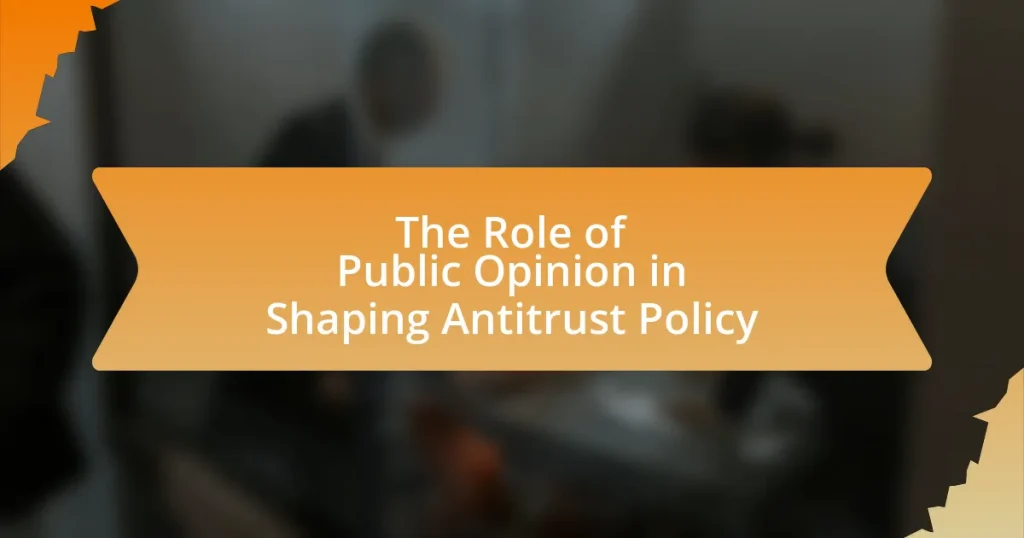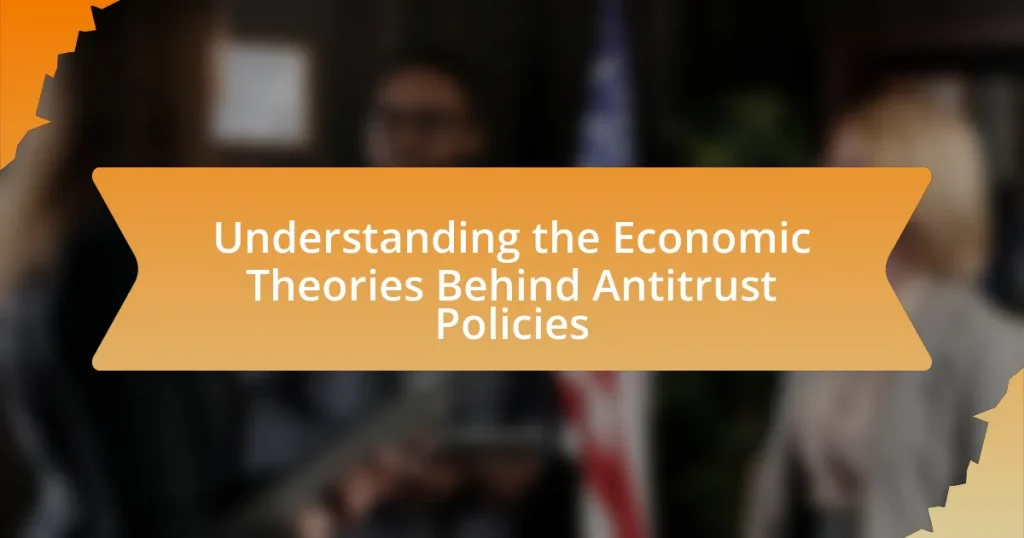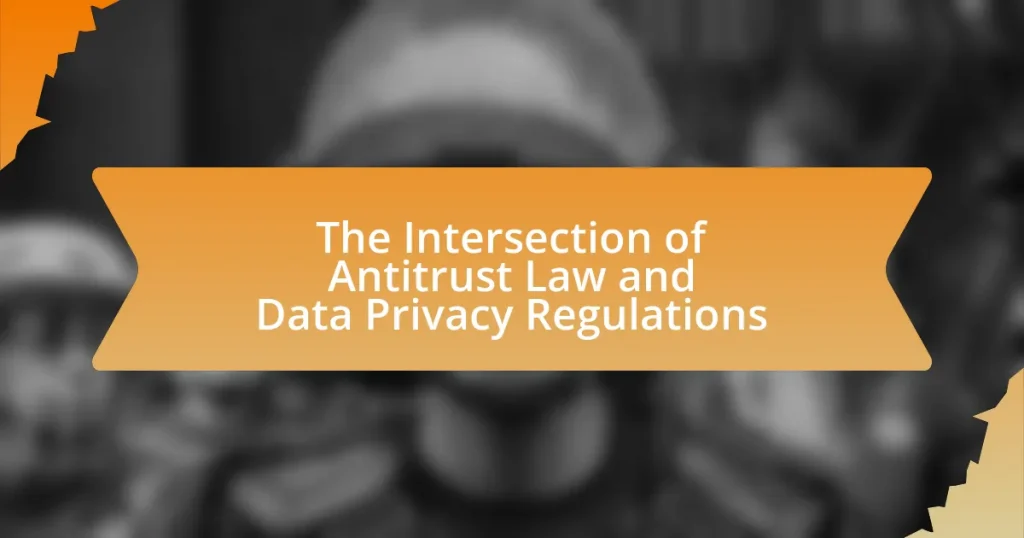The article examines the significant role of public opinion in shaping antitrust policy, highlighting how collective sentiment influences lawmakers and regulatory agencies to address concerns about market competition and corporate power. It discusses the mechanisms through which public opinion is expressed, including surveys, social media, and advocacy groups, and how these expressions impact government decisions and legal frameworks related to antitrust issues. Historical examples, such as the breakup of Standard Oil and the Microsoft antitrust case, illustrate the correlation between public sentiment and antitrust enforcement. The article also explores the challenges of aligning public opinion with legal standards and emphasizes the importance of transparency and education in fostering informed public discourse on antitrust matters.
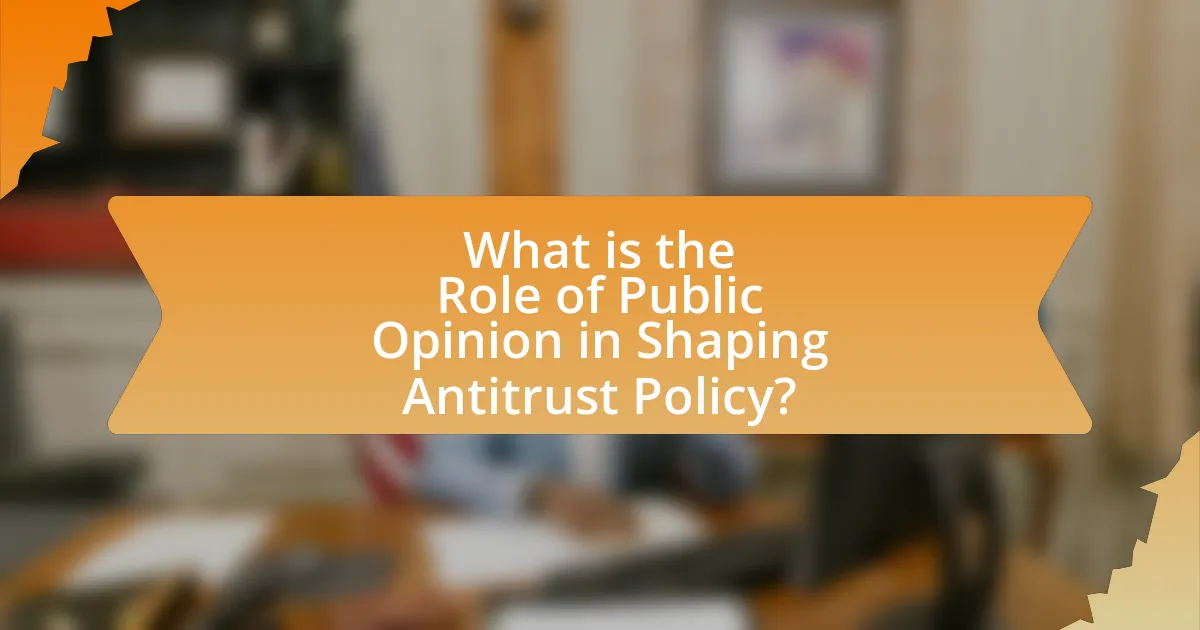
What is the Role of Public Opinion in Shaping Antitrust Policy?
Public opinion plays a crucial role in shaping antitrust policy by influencing lawmakers and regulatory agencies to address public concerns about market competition and corporate power. When a significant portion of the population expresses dissatisfaction with monopolistic practices or anti-competitive behavior, policymakers often respond by advocating for stricter antitrust regulations. For instance, the public outcry against large tech companies in recent years has led to increased scrutiny and proposed legislation aimed at curbing their market dominance. This relationship is evident in historical contexts, such as the public backlash against Standard Oil in the early 20th century, which ultimately resulted in the company’s breakup due to antitrust actions. Thus, public sentiment can drive the agenda for antitrust enforcement and reform, reflecting the collective demand for fair competition and consumer protection.
How does public opinion influence government decisions on antitrust issues?
Public opinion significantly influences government decisions on antitrust issues by shaping policymakers’ perceptions of market competition and consumer welfare. When a substantial portion of the public expresses concern over monopolistic practices or the negative impacts of large corporations, elected officials often respond by advocating for stricter antitrust enforcement. For instance, the rise of public sentiment against tech giants in the late 2010s led to increased scrutiny and calls for regulatory action, as seen in the Congressional hearings involving major companies like Facebook and Google. This public pressure can result in legislative proposals aimed at enhancing antitrust laws, reflecting the government’s responsiveness to constituents’ views on economic fairness and competition.
What are the mechanisms through which public opinion is expressed?
Public opinion is expressed through various mechanisms, including surveys, polls, social media, public demonstrations, and media coverage. Surveys and polls quantitatively gauge public sentiment on specific issues, providing data that reflects collective views. Social media platforms facilitate real-time discussions and mobilization, allowing individuals to share opinions widely and engage with others. Public demonstrations serve as a physical manifestation of collective opinion, showcasing the intensity of public sentiment on particular issues. Media coverage amplifies these expressions by reporting on public opinion trends and events, influencing broader societal perceptions. These mechanisms collectively shape the discourse around policies, including antitrust regulations, by highlighting public priorities and concerns.
How do policymakers interpret public sentiment regarding antitrust laws?
Policymakers interpret public sentiment regarding antitrust laws by analyzing surveys, public comments, and media coverage to gauge the level of concern about monopolistic practices and market competition. For instance, when a significant portion of the public expresses dissatisfaction with large corporations, policymakers may view this as a mandate to strengthen antitrust enforcement. Research from the Pew Research Center indicates that 70% of Americans believe that large companies have too much power, which influences legislative priorities and regulatory actions. This data-driven approach allows policymakers to align antitrust policies with public expectations and concerns, ensuring that they address the perceived threats to fair competition.
Why is public opinion important in the context of antitrust policy?
Public opinion is important in the context of antitrust policy because it influences lawmakers and regulators in their decision-making processes. When the public expresses concern over monopolistic practices or anti-competitive behavior, it can lead to increased scrutiny and potential reforms in antitrust laws. For instance, the public backlash against large tech companies has prompted investigations and legislative proposals aimed at curbing their market power, demonstrating how collective sentiment can drive policy changes. Additionally, public opinion can shape the political landscape, as elected officials often respond to constituents’ views to maintain support, thereby making public sentiment a critical factor in the enforcement and evolution of antitrust policy.
What historical examples illustrate the impact of public opinion on antitrust actions?
Public opinion has significantly influenced antitrust actions throughout history, notably during the early 20th century with the breakup of Standard Oil in 1911. Public outrage over the monopolistic practices of Standard Oil, fueled by investigative journalism such as Ida Tarbell’s exposé, led to widespread demand for government intervention. This culminated in the Supreme Court ruling that dissolved the company under the Sherman Antitrust Act, demonstrating how public sentiment can drive legal action against monopolies.
Another example is the Microsoft antitrust case in the late 1990s, where public concern over the company’s market dominance and its impact on competition prompted the U.S. Department of Justice to file a lawsuit. The case garnered significant media attention and public debate, ultimately resulting in a settlement that imposed restrictions on Microsoft’s business practices, illustrating the power of public opinion in shaping antitrust enforcement.
These instances highlight the critical role that public perception plays in prompting government action against perceived monopolistic behavior, reinforcing the idea that public opinion can serve as a catalyst for antitrust policy changes.
How does public opinion affect the enforcement of antitrust laws?
Public opinion significantly influences the enforcement of antitrust laws by shaping policymakers’ priorities and actions. When public sentiment favors stricter regulation of monopolistic practices, government agencies, such as the Federal Trade Commission and the Department of Justice, are more likely to pursue aggressive antitrust enforcement. For example, during the late 1990s and early 2000s, widespread public concern over the market power of companies like Microsoft led to heightened scrutiny and legal action against the tech giant. This correlation between public opinion and antitrust enforcement demonstrates that when citizens express dissatisfaction with corporate behavior, it can prompt regulatory bodies to take action to address those concerns.
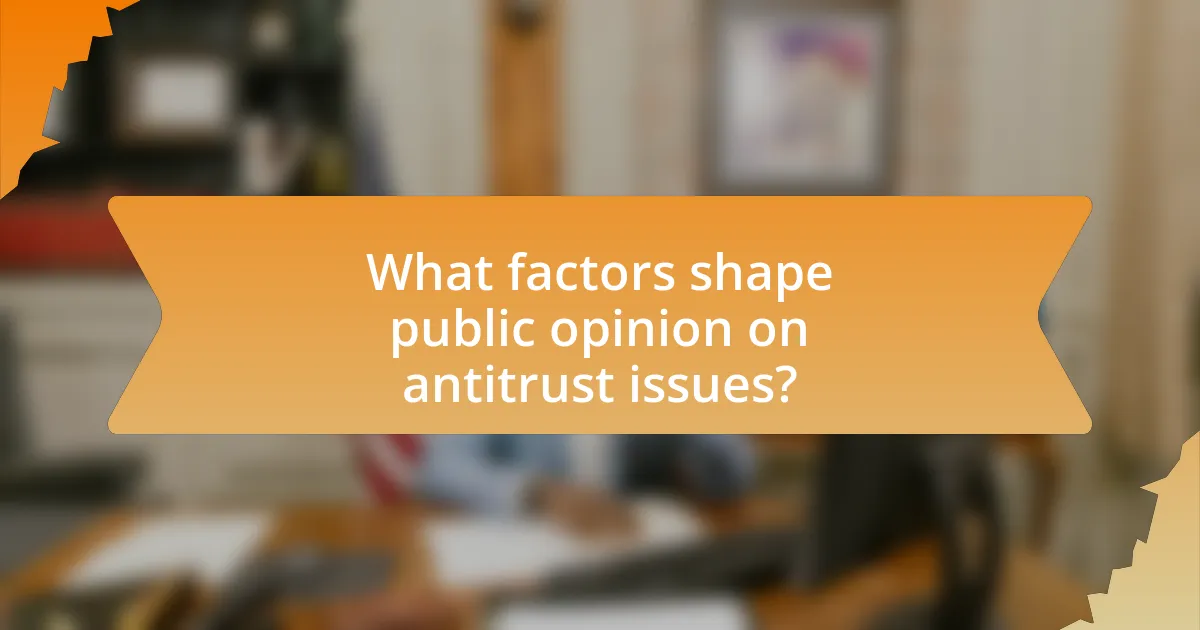
What factors shape public opinion on antitrust issues?
Public opinion on antitrust issues is shaped by several key factors, including media coverage, personal experiences with businesses, and economic conditions. Media coverage plays a crucial role by framing antitrust discussions, influencing perceptions of corporate behavior and market competition. Personal experiences, such as consumer dissatisfaction with monopolistic practices, can lead to heightened awareness and concern about antitrust issues. Economic conditions, particularly during times of economic distress or inequality, can amplify public sentiment against large corporations perceived as contributing to these problems. For instance, during the 2008 financial crisis, public scrutiny of big banks and corporations increased significantly, leading to calls for stronger antitrust enforcement.
How do media portrayals influence public perception of monopolies?
Media portrayals significantly influence public perception of monopolies by framing them as either beneficial or detrimental to society. For instance, when media outlets highlight the negative impacts of monopolistic practices, such as price manipulation or reduced consumer choice, public sentiment tends to lean towards skepticism and opposition to such entities. A study by the Pew Research Center found that 70% of Americans believe that monopolies harm competition, indicating that negative media narratives can shape widespread public concern. Conversely, when media coverage emphasizes the innovation and efficiency brought by monopolies, public perception may shift to view them as necessary for economic growth. This duality in media representation underscores its powerful role in shaping opinions, which can ultimately influence antitrust policy discussions and regulatory actions.
What role do social media platforms play in shaping public discourse on antitrust?
Social media platforms significantly influence public discourse on antitrust by facilitating the rapid dissemination of information and opinions. These platforms enable users to share articles, engage in discussions, and mobilize collective action, which can amplify concerns about monopolistic practices and corporate power. For instance, campaigns on platforms like Twitter and Facebook have raised awareness about specific antitrust cases, such as the scrutiny of major tech companies, leading to increased public pressure on policymakers. Research indicates that social media discussions can shape perceptions and attitudes toward antitrust issues, as seen in the heightened public engagement surrounding the 2020 antitrust hearings involving major tech firms.
How do economic conditions affect public attitudes towards large corporations?
Economic conditions significantly influence public attitudes towards large corporations, often leading to increased scrutiny and skepticism during downturns. For instance, during economic recessions, unemployment rises and consumer confidence declines, prompting the public to perceive large corporations as prioritizing profits over social responsibility. This sentiment is supported by a 2020 Gallup poll indicating that 56% of Americans viewed large corporations negatively during the COVID-19 pandemic, reflecting concerns over layoffs and corporate bailouts. Conversely, in periods of economic growth, public attitudes tend to be more favorable, as people associate large corporations with job creation and innovation, evidenced by a 2018 Pew Research study showing that 70% of respondents had a positive view of corporations when the economy was thriving. Thus, economic conditions play a crucial role in shaping public perceptions of large corporations, impacting their reputation and the regulatory environment surrounding them.
What role do advocacy groups play in shaping public opinion on antitrust policy?
Advocacy groups play a crucial role in shaping public opinion on antitrust policy by raising awareness, mobilizing grassroots support, and influencing policymakers. These organizations often conduct research, publish reports, and engage in public campaigns that highlight the negative impacts of monopolistic practices, thereby educating the public on the importance of antitrust regulations. For instance, groups like the American Antitrust Institute have been instrumental in advocating for stronger enforcement of antitrust laws, which has led to increased public discourse and scrutiny of corporate behavior. Their efforts can result in heightened public concern, which in turn pressures legislators to consider reforms that align with the interests of consumers and competition.
How do grassroots movements influence public awareness of antitrust issues?
Grassroots movements significantly influence public awareness of antitrust issues by mobilizing community engagement and disseminating information about monopolistic practices. These movements often utilize social media platforms and local events to educate the public on the implications of corporate consolidation, thereby fostering a collective understanding of antitrust concerns. For instance, campaigns like “Stop Amazon” have raised awareness about the detrimental effects of monopolies on local businesses and consumer choice, leading to increased public discourse and pressure on policymakers. Research indicates that heightened public awareness can result in greater advocacy for regulatory reforms, as seen in the growing calls for antitrust action against major tech companies in recent years.
What strategies do advocacy organizations use to mobilize public opinion?
Advocacy organizations mobilize public opinion through strategies such as grassroots campaigns, social media engagement, and coalition building. Grassroots campaigns involve organizing community members to participate in demonstrations, petitions, and local events, effectively amplifying their message and increasing visibility. Social media engagement allows these organizations to reach a broader audience quickly, utilizing platforms to share information, mobilize supporters, and create viral content that resonates with the public. Coalition building involves partnering with other organizations and stakeholders to unify efforts, thereby enhancing credibility and expanding outreach. For example, the American Civil Liberties Union (ACLU) has successfully mobilized public opinion on various issues by leveraging these strategies, resulting in significant public support and policy changes.
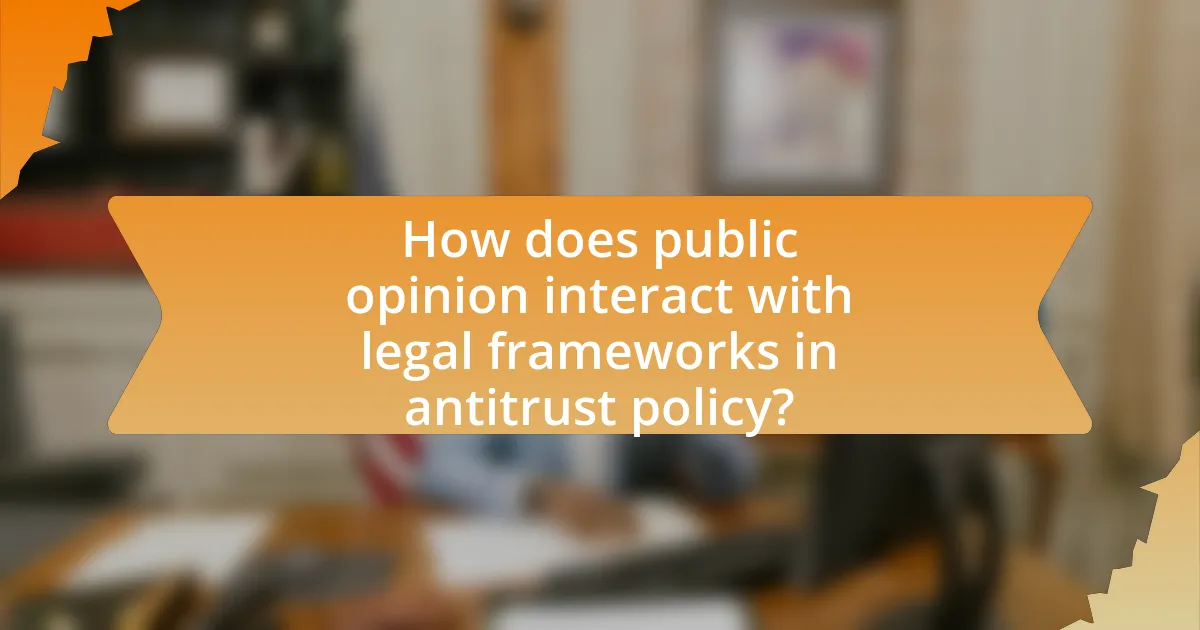
How does public opinion interact with legal frameworks in antitrust policy?
Public opinion significantly influences legal frameworks in antitrust policy by shaping regulatory priorities and enforcement actions. When public sentiment favors stricter regulations against monopolistic practices, policymakers often respond by advocating for more robust antitrust laws or increased scrutiny of large corporations. For instance, the rise of public concern over tech giants’ market power has led to renewed calls for antitrust investigations, as seen in the 2020 Congressional hearings involving major tech companies. This interaction is evident in how public advocacy groups mobilize support for legislative changes, which can result in amendments to existing laws or the introduction of new regulations aimed at promoting competition and protecting consumers.
What are the legal implications of public opinion in antitrust cases?
Public opinion can significantly influence the legal landscape of antitrust cases by shaping regulatory priorities and enforcement actions. When a substantial portion of the public perceives a company as engaging in anti-competitive behavior, this sentiment can lead to increased scrutiny from regulatory bodies such as the Federal Trade Commission (FTC) and the Department of Justice (DOJ). For instance, public backlash against monopolistic practices can prompt these agencies to initiate investigations or pursue litigation, as seen in high-profile cases like the antitrust actions against Microsoft in the late 1990s, where public concern about market dominance played a crucial role in the legal proceedings. Additionally, public opinion can affect legislative changes, as lawmakers may respond to constituents’ demands for stricter antitrust enforcement, thereby altering the legal framework within which antitrust cases are evaluated.
How do courts consider public sentiment in antitrust litigation?
Courts consider public sentiment in antitrust litigation by evaluating how consumer perceptions and societal attitudes influence market competition and corporate behavior. This consideration is evident in cases where public opinion may highlight anti-competitive practices, prompting courts to assess the broader implications of corporate actions on consumer welfare. For instance, in the landmark case of United States v. Microsoft Corp., public sentiment regarding monopolistic practices played a role in shaping the court’s analysis of the company’s impact on innovation and consumer choice. Courts may also reference public surveys or expert testimonies that reflect consumer attitudes, thereby integrating public sentiment into their legal reasoning and decisions.
What challenges arise when aligning public opinion with legal standards?
Aligning public opinion with legal standards presents challenges such as differing perceptions of fairness and justice. Public opinion can be influenced by emotions, media portrayal, and personal experiences, which may not align with the objective criteria established by legal standards. For instance, in antitrust cases, the public may perceive certain business practices as harmful based on anecdotal evidence or media narratives, while legal standards require a more rigorous economic analysis to determine anti-competitive behavior. This discrepancy can lead to public pressure on lawmakers to enact policies that may not be legally sound or economically justified, complicating the legislative process and potentially resulting in laws that do not effectively address the underlying issues.
How can policymakers effectively gauge public opinion on antitrust matters?
Policymakers can effectively gauge public opinion on antitrust matters by utilizing a combination of surveys, focus groups, and social media analysis. Surveys provide quantitative data on public sentiment, allowing policymakers to identify trends and concerns regarding market competition. For instance, a 2021 survey by the Pew Research Center found that 60% of Americans believe that large companies have too much power, indicating a significant public concern about monopolistic practices. Focus groups offer qualitative insights, enabling deeper understanding of public attitudes and the reasons behind them. Additionally, analyzing social media conversations can reveal real-time public reactions to antitrust issues, as demonstrated by the increased discussions surrounding major tech companies’ market behaviors. By integrating these methods, policymakers can obtain a comprehensive view of public opinion, which is crucial for shaping effective antitrust policies.
What tools and methods are available for measuring public sentiment?
Tools and methods available for measuring public sentiment include surveys, social media analysis, sentiment analysis software, and focus groups. Surveys, such as those conducted by Gallup or Pew Research, provide quantitative data on public opinions and attitudes. Social media analysis leverages platforms like Twitter and Facebook to gauge real-time sentiment through user-generated content. Sentiment analysis software, such as IBM Watson or Lexalytics, employs natural language processing to analyze text data for emotional tone. Focus groups facilitate qualitative insights by gathering diverse perspectives on specific issues. These methods collectively offer a comprehensive understanding of public sentiment, essential for informing antitrust policy decisions.
How can surveys and polls be designed to accurately reflect public views on antitrust?
Surveys and polls can be designed to accurately reflect public views on antitrust by employing clear, unbiased questions that avoid leading language. This approach ensures that respondents can express their true opinions without influence. Additionally, using a representative sample of the population enhances the validity of the results, as it captures diverse perspectives across different demographics.
For instance, a study by the Pew Research Center in 2021 found that surveys with balanced wording and randomized response options yielded more reliable data on public sentiment regarding corporate monopolies. Furthermore, incorporating open-ended questions allows respondents to elaborate on their views, providing richer qualitative data that quantitative measures alone may miss.
What best practices can be adopted to align public opinion with antitrust policy goals?
To align public opinion with antitrust policy goals, transparency in policy-making and effective communication strategies should be adopted. Transparency allows the public to understand the rationale behind antitrust decisions, fostering trust and support. For instance, the Federal Trade Commission (FTC) has utilized public forums and reports to explain its actions, which has helped demystify antitrust processes. Additionally, engaging stakeholders through surveys and public consultations can provide insights into public concerns and expectations, ensuring that policies reflect societal values. Research indicates that when the public is informed and involved, support for antitrust measures increases, as seen in the 2021 public response to proposed regulations on big tech companies.
How can transparency in policymaking enhance public trust in antitrust enforcement?
Transparency in policymaking enhances public trust in antitrust enforcement by allowing citizens to understand the rationale behind decisions and actions taken by regulatory bodies. When policymakers openly share information about their processes, criteria for enforcement, and the outcomes of investigations, it demystifies the enforcement actions and fosters a sense of accountability. For instance, studies have shown that when the Federal Trade Commission (FTC) publishes detailed reports on antitrust cases, public confidence in the agency’s effectiveness increases, as citizens feel more informed and involved in the regulatory process. This transparency reduces perceptions of bias or corruption, thereby strengthening the legitimacy of antitrust enforcement in the eyes of the public.
What role does education play in shaping informed public opinion on antitrust issues?
Education plays a crucial role in shaping informed public opinion on antitrust issues by providing individuals with the knowledge necessary to understand complex economic concepts and legal frameworks. Through educational programs, workshops, and accessible resources, the public gains insights into how monopolistic practices can affect market competition, consumer choice, and innovation. For instance, studies have shown that increased awareness of antitrust laws correlates with greater public support for regulatory measures aimed at promoting competition, as evidenced by surveys conducted by the Pew Research Center, which indicate that informed citizens are more likely to advocate for stronger antitrust enforcement. Thus, education empowers the public to engage in meaningful discourse and influence policy decisions regarding antitrust matters.
